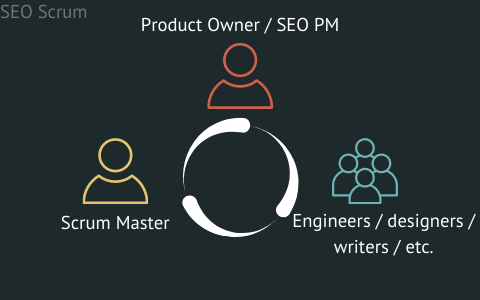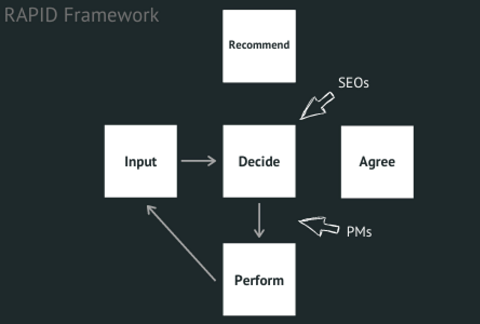In search, it doesn’t matter what you know but what you ship. Implementation is the hill great SEO ideas die on.
Is that the case because “executives simply don’t value SEO?”
No!
It’s a matter of good management. Most ideas simply fail because they’re unclear to others, don’t have a significant opportunity size, and success isn’t well-defined.
SEO professionals are subject matter experts. We dip into many roles but chronically don’t have enough time or expertise to manage every SEO project from A to Z.
As consultants, the matter is even more complicated because they’re paid to give recommendations, not to manage projects. That is the linchpin!
Enter the SEO PM (product management, not project management), a role at the intersection of project management, alignment, and customer advocacy.
Many will say, “But Kevin, this is what SEO pros should do!”
And they’re right – in theory.
Practically, however, SEO teams (and agencies) would tremendously benefit from an SEO PM.
What Does an SEO Product Manager Do?
SEO PMs are not glorified project managers. They are product managers – and it’s a big difference.
Most PMs will tell you that they’re “problem solvers.” Their typical job description looks something like, “This is bad; go fix it.”
Some describe the role as “janitor,” but I think a more accurate description is “universal problem-solver in charge.”
They have to do research, persuade other teams with influence, and work on solid narratives. In some way, PMs are the glue of product organizations because they have to collaborate with lots of different functional teams to be successful.

In the Scrum framework, Product Managers are the equivalent of Product Owners. They help shape the vision, strategy, and roadmap together with SEO professionals.
They talk to users (SEO pros), write user stories, and prioritize the backlog.
Most importantly, SEO PMs are the bridge between subject matter experts (SEO pros) and executing teams (engineers, content writers, UX designers, etc.).
Their job is to get things done.

In the RAPID framework, SEO is the Decider. Engineers, designers, or writers Perform and provide Input.
PMs sit in the middle. They might give recommendations and get agreement from other stakeholders, but fundamentally, they bring work from decision to execution.
That liaison is vital because the constant back and forth between vision and execution can take up a lot of time. Engineers need to scope features out, and SEO professionals need to understand the impact or execution.
Someone managing between the two (or several) sides and streamlining that process over time provides a lot of value.
In some organizations, SEO pros take the role of product manager. But in many cases, there simply isn’t enough time, and many SEO pros are not educated to take that role.
They have to focus on keyword research, monitoring, technical SEO, internal education, quality assurance, competitor analysis, and more.
Imagine, on top of all that, if they had to size opportunities, write user stories, create mockups, answer questions from engineering, etc.
That’s just unrealistic.
Some responsibilities of SEO professionals overlap with that of PMs, and that’s okay. PMs can drive SEO pros to define clearer roadmaps and strong visions.
SEO pros can help PMs develop subject matter expertise and move projects forward faster. Together, they’re an unstoppable force.
A full list of PM responsibilities could include:
- Shape the vision, strategy, and roadmap for an SEO feature or product.
- Get supporting teams to execute.
- Remove roadblock.
- Collect questions, ideas, and advice.
- Create key documents.
- Opportunity sizing.
- Aligning teams and stakeholders.
- Reporting progress, not just metrics.
- Identify dependencies.
- Set timings.
What do we consider SEO projects? The list is long:
- Creating a new content hub.
- Refreshing a list of articles.
- Technical optimization.
- Internal tooling.
- UX changes.
- New landing pages.
- etc.
When you do SEO at a small organization, these might seem trivial. But in larger ones, each of those projects takes management.
Imagine SEO Was a Product
Driving the rise of the SEO PM is the product of a search engine that gets better at understanding content quality and overcoming technical challenges.
Google still needs assistance and is far away from decoding implicit meaning. But giant leaps in machine learning over the last five years give SEO professionals the room to focus on good products and content.
In a recent Search Off the Record podcast, John Mueller spoke about what I call “the fluidity of Search.” I would summarize his monologue in six points:
- Google looks at many ranking signals, and they change over time.
- It’s hard, maybe impossible, for humans to reverse engineer all factors.
- We need to avoid making a single factor responsible for ranking position.
- Several similar pages can rank at the top if they fulfill different user intents for the same keyword (example).
- As Google’s understanding of queries and user intent changes, so can the ranking composition.
- Rankings can fluctuate wildly, sometimes without obvious reason.
When we see SEO as a product in itself, we free ourselves from obsessing over ranking factors and algorithm updates.
Instead, we can take an iterative approach to SEO. I call this “zero-based SEO,” where we don’t think we know what users and Google want, run continuous experiments, and match the site’s experience against the top results.
Instead of following dogmatic SEO tactics, we develop tactics that fit our unique product, market, and business model from the ground up.
The “zero-based SEO” approach is much more hands-on and fast-paced than the classic waterfall model.
It allows for quicker feedback loops. Other than working on an SEO feature for five months and rolling it out, the goal is to ship an MVP (minimum viable product) and iterate quickly.
MVPs make opportunity sizing, a common bottleneck for getting things done, much more straightforward.
We SEO professionals are prisoners of search volume, a flawed metric developed for Google Ads. The fruitful alternative is rolling an idea out at a small scale, measuring impact, and then extrapolating.
SEO PMs play a crucial part in this approach. They align everyone, help set priorities, and can work with the executing teams on the details.
You might have already noticed that “Agile,” “Waterfall” and MVP are terms from product development. That’s my point: why not look at SEO as a product in itself?
If we manage it like a product, we can get rid of a lot of the SEO constraints we’ve been dealing with for ages and focus on getting things done.
The SEO PM is a linchpin in this worldview.
More Resources:
- Top 8 Skills Every Great SEO Professional Needs to Succeed
- What’s the Role of Today’s SEO Professional?
- SEO for Beginners: An Introduction to SEO Basics
Image Credits
In-post image 2: Bain & Company
All screenshots taken by author, May 2021





![[SEO, PPC & Attribution] Unlocking The Power Of Offline Marketing In A Digital World](https://www.searchenginejournal.com/wp-content/uploads/2025/03/sidebar1x-534.png)